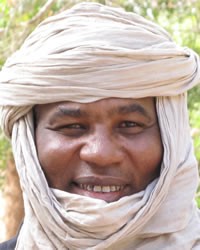Tuareg, Tamajaq in Mali

Photo Source:
Link Up Africa
|
Send Joshua Project a map of this people group.
|
| People Name: | Tuareg, Tamajaq |
| Country: | Mali |
| 10/40 Window: | Yes |
| Population: | 486,000 |
| World Population: | 1,753,000 |
| Primary Language: | Tamajaq, Tawallammat |
| Primary Religion: | Islam |
| Christian Adherents: | 0.00 % |
| Evangelicals: | 0.00 % |
| Scripture: | New Testament |
| Ministry Resources: | Yes |
| Jesus Film: | Yes |
| Audio Recordings: | Yes |
| People Cluster: | Tuareg |
| Affinity Bloc: | Arab World |
| Progress Level: |
|
Introduction / History
The Tuareg tribe is a Berber group and they are very unusual. Their distinguishing characteristics include their language, their unique alphabet which uses "tifinagh" characters, and their complex social organization. The Tuareg are divided into several main political groups or tribal units. Although the origin and early history of the Tuareg are obscure, these tribal nomads appear to have traveled down from North Africa in a series of migrations as early as the seventh century. By the end of the 1300s, Tuareg tribes had established themselves as far south as the Nigerian border.
Today most Tuareg people are permanently settled either in Mali or Niger, but a smaller number of them are in Nigeria or France. In Mali there are a couple of Tuareg subgroups, divided by dialect. One of these is the Tamajaq Tuareg, and they speak Tawallammat Tamajaq. Most of what one can say about one Tuareg subgroup applies to all the others as well.
In 1972, the worst drought in 50 years struck the Sahara, bringing disaster and severe stress to the Tuareg. The nomads were forced to travel southward with their families in search of pastures for their herds. This massive migration intensified as water supplies began to fail. Conflicts over rights and obligations among the people and governments of the regions were also generated. Many animals died of thirst, hunger, or fatigue during the long journey. Thousands of Tuareg drifted to the cities where they set up cowhide shelters and lean-to shanties on the fringes of town. Although the rains in 1974 were good, they did not wash away the serious economic and social effects of the drought, and life for the Tuareg was never to be the same.
What Are Their Lives Like?
Many Tuareg, tempted by the less rigorous urban lifestyle, never returned to their original homeland after these droughts in the 1970s. Others still depend on their animals for survival; however, meat and milk are not enough, especially during the dry years. The basic elements of the Tuareg diet are milk, grains, and dates. They rarely eat fresh vegetables. Millet is raised both in the Saharan oases and in Sudan. Though they prefer meat, they don't eat it on a regular basis. Goat is the most commonly eaten meat; camel is rarely eaten.
Tuareg nomads live in small, lightweight, leather tents or grass huts. A tent is usually about 10 feet long and 10 to 15 feet wide. A household can pack its goods on the backs of two camels, while one or two donkeys carry their odds and ends. The Tuareg wear clothing that is loose and lightweight. In direct contrast to Arab custom, all of the men wear veils called tidjelmousts; the women do not wear veils. The most preferred tidjelmousts are dyed indigo, though many men wear black. To show respect, the men always cover their mouths, noses, and foreheads while in the presence of foreigners or their in-laws.
In the Southern Sahara, many Tamajaq Tuareg are now settled farmers living in villages surrounded by grain fields. Since farming is seasonal work, many of the young men also take jobs as blue-collar workers in Nigeria, Ghana, or Cote d'Ivoire for part of the year.
What Are Their Beliefs?
Though Tuareg Tamajaq people in Mali are virtually all Sunni Muslim, they have a reputation among other Muslims for being lukewarm in their faith. They practice a passive form of Islam, infused with folk beliefs and magic. Most do not even celebrate the most important Muslim fast of Ramadan. These people depend upon good works to pay the penalty for their sins. They depend upon the spirit world for their daily needs because they regard Allah as too distant. They believe that Allah may determine their eternal salvation, but the spirits determine how well they live in their daily lives. Consequently, they must appease the spirits. They often use charms and amulets to help them with spiritual forces.
What Are Their Needs?
The greatest need of this people group is to hear and understand the infinite love of Almighty God who has paid the penalty of all their sins. They need to be set free from fear and domination of evil spirits that dominate their lives. Who will take them the life-changing gospel?
Prayer Points
Pray for the very few believers among the Tamasheq people in Mali, that the Lord will nurture and protect their faith and send them qualified pastors and teachers.
Pray that Tuareg Tamajaq people in Mali will come to know the living Lord through radio broadcasts, films, audio resources and personal contacts with believers who will work with them to establish a Disciple Making Movement.
Ask the Lord to send loving Christ followers from other parts of Africa to share the gospel with the Tuareg peoples in Mali.
Ask the Lord to save key leaders among the Tuareg who will boldly declare the gospel, influencing family leaders.